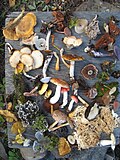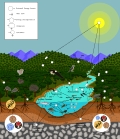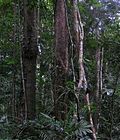A functional group is merely a set of species, or collection of organisms, that share alike characteristics within a community. Ideally, the lifeforms...
15 KB (2,047 words) - 12:22, 10 February 2024
Functional ecology is a branch of ecology that focuses on the roles, or functions, that species play in the community or ecosystem in which they occur...
24 KB (2,902 words) - 03:43, 18 May 2024
organic chemistry, a group of atoms responsible for the characteristic chemical reactions of a molecule Functional group (ecology), a collection of organisms...
497 bytes (95 words) - 22:07, 12 March 2024
In ecology, functional equivalence (or functional redundancy) is the ecological phenomenon that multiple species representing a variety of taxonomic groups...
8 KB (1,038 words) - 14:28, 13 January 2023
and sedges) Plankton Saprophytes Shrubs Trees Vines Piscivores Functional group (ecology) Look up guild in Wiktionary, the free dictionary. An ecological...
8 KB (941 words) - 05:17, 13 May 2024
(1927). Animal Ecology. London: Sidgwick and Jackson. ISBN 0-226-20639-4. Davic, R. D. (2003). "Linking keystone species and functional groups: a new operational...
210 KB (21,525 words) - 06:09, 3 September 2024
Functional diversity (ecology), the elements of biodiversity that influence how ecosystems function; see diversity-function debate Functional diversity (geography)...
538 bytes (91 words) - 00:01, 23 February 2015
economically viable commodity production. A major focus of ecosystem ecology is on functional processes, ecological mechanisms that maintain the structure and...
23 KB (2,959 words) - 12:41, 6 June 2024
during drought varies with background hydrologic regime and plant functional group". Ecology. 91 (6): 1672–1681. Bibcode:2010Ecol...91.1672D. doi:10.1890/09-0567...
54 KB (8,502 words) - 00:25, 2 September 2024
during drought varies with background hydrologic regime and plant functional group". Ecology. 91 (6): 1672–1681. Bibcode:2010Ecol...91.1672D. doi:10.1890/09-0567...
41 KB (4,824 words) - 05:00, 28 August 2024
1940s, ecology was divided into autecology—the study of individual species in relation to the environment—and synecology—the study of groups of species...
31 KB (3,551 words) - 16:12, 1 June 2024
In ecology, a community is a group or association of populations of two or more different species occupying the same geographical area at the same time...
45 KB (5,316 words) - 22:38, 13 June 2024
of uniformity in land use. Landscape ecology explores the landscape's natural potential in terms of functional utility for human societies. To analyse...
46 KB (5,273 words) - 06:26, 12 July 2024
Ecological Society of America Ecological wisdom Ecology Ecology (journal) Ecology Functional Groups Ecology movement Eco-marathon Economic vegetarianism...
40 KB (3,771 words) - 00:36, 7 July 2024
Plant ecology is a subdiscipline of ecology that studies the distribution and abundance of plants, the effects of environmental factors upon the abundance...
39 KB (3,768 words) - 02:03, 17 June 2024
Biodiversity (redirect from Functional diversity (ecology))
Applied Ecology. 40 (2): 193–203. Bibcode:2003JApEc..40..193C. doi:10.1046/j.1365-2664.2003.00803.x. Lefcheck, Jon (20 October 2014). "What is functional diversity...
155 KB (16,673 words) - 23:27, 1 October 2024
freshwater biology functional ecology A branch of ecology which studies the roles, or functions, that certain species (or groups of species) play in...
56 KB (6,059 words) - 06:56, 23 February 2024
number of species from one group by the total number of species from all groups. These measures are all a part of community ecology. Understanding patterns...
7 KB (894 words) - 00:58, 11 October 2023
ecology of organizations is divided into three levels, the community, the population, and the organization. The community level is the functionally integrated...
12 KB (1,605 words) - 03:16, 23 June 2023
animal behavior and group dynamics, food webs, ecosystems, spatial ecology, and the effects of climate change. Theoretical ecology has further benefited...
62 KB (7,491 words) - 00:10, 7 April 2024
Cultural ecology is the study of human adaptations to social and physical environments. Human adaptation refers to both biological and cultural processes...
26 KB (3,616 words) - 12:22, 21 August 2024
Phosphate (redirect from Phosphate group)
In chemistry, a phosphate is an anion, salt, functional group or ester derived from a phosphoric acid. It most commonly means orthophosphate, a derivative...
30 KB (2,582 words) - 02:29, 27 September 2024
Freshwater ecosystem (redirect from Freshwater ecology)
two ecosystems form the more general study area of freshwater or aquatic ecology. A wetland is a distinct semi-aquatic ecosystem whose groundcovers are...
18 KB (2,893 words) - 18:06, 12 September 2024
Forest ecology is the scientific study of the interrelated patterns, processes, flora, fauna, funga, and ecosystems in forests. The management of forests...
23 KB (2,730 words) - 10:01, 25 August 2024
Functional extinction is the extinction of a species or other taxon such that: It disappears from the fossil record, or historic reports of its existence...
22 KB (2,399 words) - 01:15, 26 September 2024
Some examples of behavioural ecology Behavioral ecology, also spelled behavioural ecology, is the study of the evolutionary basis for animal behavior due...
107 KB (13,874 words) - 20:20, 5 February 2024
In ecology, the competitive exclusion principle, sometimes referred to as Gause's law, is a proposition that two species which compete for the same limited...
23 KB (2,721 words) - 17:25, 9 June 2024
organic compounds Productivity (ecology) – Rate of generation of biomass in an ecosystem Primary nutritional groups – Group of organisms Standing stock –...
46 KB (4,207 words) - 22:04, 23 May 2024
(also called the resource-ratio hypothesis) is a hypothesis in community ecology that attempts to predict which species will become dominant as the result...
7 KB (886 words) - 05:26, 9 May 2024
In ecology, a feeding frenzy is a type of animal group activity that occurs when predators are overwhelmed by the amount of prey available. The term is...
3 KB (279 words) - 23:27, 3 February 2024


















